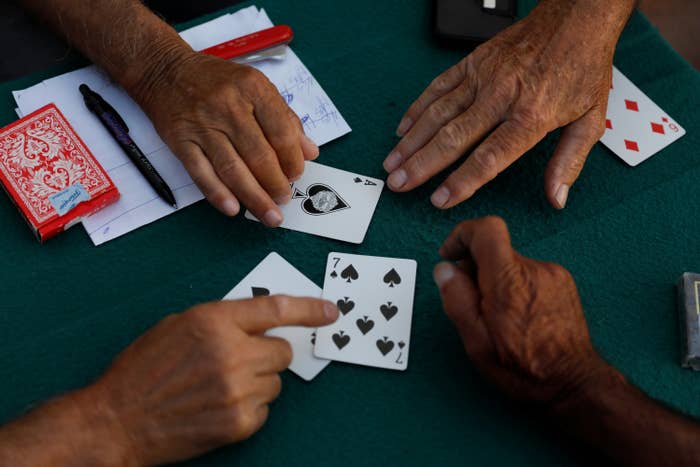
The journalists at BuzzFeed News are proud to bring you trustworthy and relevant reporting about the coronavirus. To help keep this news free, become a member and sign up for our newsletter, Outbreak Today.
The weekend of Feb. 29 found Jeffrey Rapp in his element at the Colorado Springs Bridge Center in Colorado Springs, Colorado. It was a tournament for what they call 299ers — relative newcomers — and Rapp was the computer technician and de facto caterer, uploading scores into the American Contract Bridge League database and handing out slices of cake to the mostly elderly players.
On March 13, Rapp returned to the center to find the doors locked and signs indicating the club was closed. Inside, he found a cleaning crew disinfecting the hallways. Shortly thereafter he found out: An 82-year-old woman, with whom he had been bridge partners, had just died from COVID-19, the disease caused by the coronavirus.
“I saw her over the course of the tournament,” Rapp told BuzzFeed News. “She was happy and competitive and in good spirits. Not symptomatic. And a few days later, she’s dead.”
It was the first of four deaths and more than 20 hospitalizations linked to the two-day tournament, during which around 150 players gathered at tables of four inside a club where the average member is 72 years old. The El Paso County coroner estimated Wednesday that 300 people in the Colorado Springs area had been infected from the event, making Colorado’s second city the center of COVID-19’s spread in the Mountain West. And in ravaging the membership of a vibrant local community, the virus continued its tragic pattern of turning festive gatherings into deadly ones.
Like most COVID-19 outbreaks, this one hit elderly people and people with preexisting conditions the hardest. According to John Dukellis, a bridge teacher and director at the club, two of the deceased were over 80 and the other two had chronic health concerns.
“People are scared,” Dukellis told BuzzFeed News.
“It’s frightening,” Rapp said. “So many people I’ve been playing bridge with for so many years, in some cases people I’ve known for 40 or 50 years, have wound up in the hospital. As you might suspect, some of our players are in their eighties and nineties. They are in the most susceptible demographic. These are older people who are looking to have a good time with what they have left of their lives.”
The weekend was a good time — initially. According to Rapp, a few members raised concerns about the gathering, and those members stayed home. Prior to the tournament, Rapp found bottles of hand sanitizer in the club’s storeroom and placed them around the 20-odd tables where groups of four sat quietly bidding. Rapp, who has not been tested for COVID-19 but has experienced no symptoms, attributes his good fortune partially to his job distributing food.
“Because I had to wash my hands several times an hour, I probably had the cleanest hands in the state that day,” Rapp said.
In the following days, as the disease incubated in dozens of players, there were no signs anything was wrong. Dukellis saw the first woman to die at the game he ran the following Tuesday, where she showed no indication of ill health.
“No one knew what was going on,” Dukellis said. “We hadn’t had any cases in Colorado.”
On Friday, March 12, the club closed, per guidance from the state. And still the club’s leadership had no idea what was about to happen. That same day, Dukellis had a conversation with another game director at the club and remembered finding the man's appearance to be strange.
“He was looking at me with a blank stare, looking right through me,” Dukellis said.
The next day, the man was found delirious in his house and taken to the hospital. According to Dukellis, the other man is still on a ventilator.
“We had an outbreak at a place where large numbers of one of our most vulnerable categories congregate,” Dr. Leon Kelly, the El Paso County coroner, told KRDO Wednesday. "Right out of the gate, in many ways, we had a worse-case scenario. That's why we all need to take this virus seriously.”
Word that club members were getting sick spread via phone chains and emails. Then it was the family of club members who sickened. The weekend tournament drew players from all over the state and as far away as Massachusetts, leading to fears that participants might be spreading the disease around the region and further. Dukellis received an angry call from a member of a bridge club in Tucson, Arizona, where several members of the Colorado Springs Bridge Center had traveled to play in a tournament March 2–8. (Two players in that tournament have tested positive for COVID-19.)
But the mood among the membership, according to Dukellis and Rapp, has mostly been one of shock, fear, and sadness. Dukellis, who would later come down with a mild fever, took a list of names from the tournament to the El Paso County Health Department.
“They said it was overwhelming,” Dukellis recalled.
